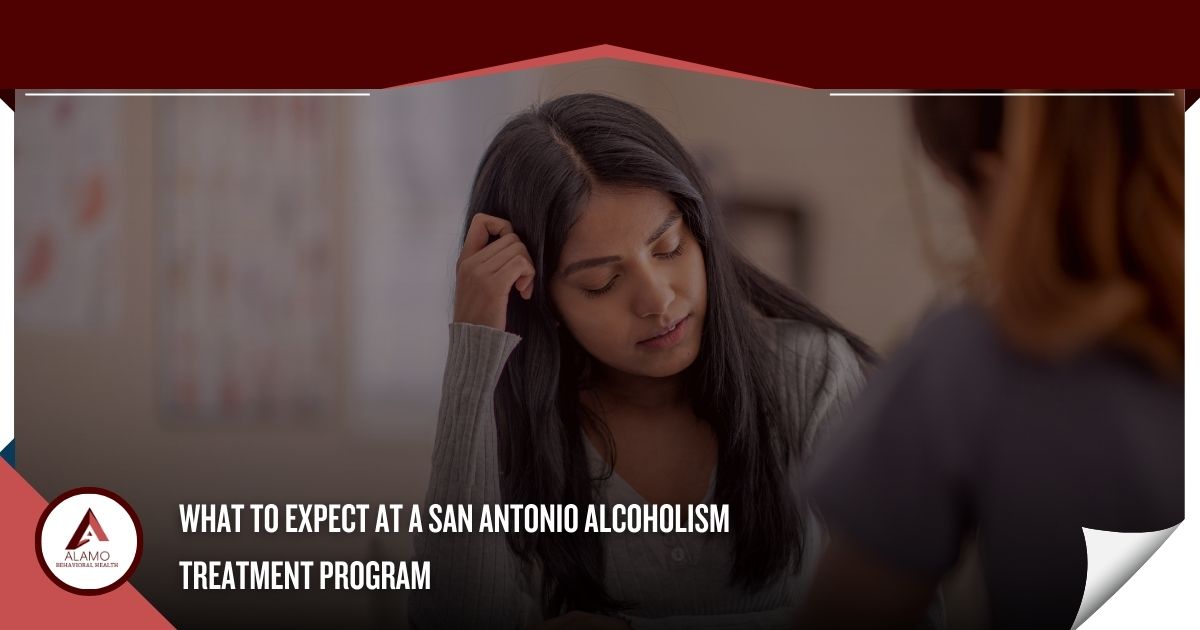
Alcoholism is a progressive disease that affects one’s ability to control their drinking. Without treatment, some alcoholics drink until it takes a serious, sometimes life-changing toll on their mental or physical health. Attending an alcoholism treatment program is the best way to detox safely, heal from the effects of alcohol abuse, and gain the tools and resources needed to stay sober.
Going to rehab can be scary, but knowing what to expect can ease your nerves and prepare you for the treatment process. In this article, you’ll learn about your different alcohol rehab options and what to expect during alcoholism treatment in San Antonio.
Types of Alcohol Rehab Programs in San Antonio
Alcoholism treatment can happen in several formats, including:
- Inpatient rehab – Also known as residential treatment, these programs require clients to live at the treatment center throughout their care. Inpatient rehab provides a safe and supportive environment away from triggers and stressors of daily life.
- Partial hospitalization – Often referred to as PHP, these programs offer all-day treatment and intensive therapy, but clients return home or to a sober living at night. This level of care is a great stepping stone for those transitioning out of a residential setting.
- Outpatient rehab – Outpatient programs provide part-time care. Individuals commute to the substance abuse treatment facility several days a week for a couple of hours at a time, attending group and individual therapy sessions with a focus on relapse prevention.
What to Expect When Seeking Treatment for Alcoholism in San Antonio, TX
Alcohol addiction treatment centers in San Antonio provide many services to address the physical, mental, and emotional aspects of alcoholism so clients can recover. Treatment involves:
Intake and Assessment
Treatment at a San Antonio recovery center begins with intake and an assessment. If entering a residential program, intake involves a baggage and personal items search to ensure there are no prohibited items brought into the rehab center. It also involves signing paperwork consenting to treatment.
After being admitted to the treatment facility, clients complete a series of assessments and evaluations. The clinical team may ask questions about mental and physical health, substance abuse, family history, treatment goals, and more. They may also perform a physical exam, psychiatric assessment, and urinalysis drug test. Some programs may require blood work.
The information gathered in your assessment is used to create a treatment plan that is designed with your needs in mind. Everyone is unique, so everyone’s treatment plan may look slightly different.
Medical Detox
The next part of alcohol addiction treatment is medical detox. Detoxing from alcohol can be potentially life-threatening, so it’s essential to detox under medical supervision. During medical detox, doctors can prescribe medications to ease withdrawal symptoms and prevent complications like seizures and delirium tremens (DTs). Alcohol detox and rehabs in San Antonio provide around-the-clock supervision and monitoring to ensure client comfort and safety.
Counseling & Therapy
After detoxing, the bulk of treatment involves counseling and behavioral therapy. Counseling provides emotional support and guidance to those in recovery while behavioral therapy helps modify addictive behaviors and treat co-occurring mental health conditions. Together, counseling and behavioral therapy arm individuals with the coping skills they need to stay sober.
Counseling and therapy may take several formats, including:
- Group therapy
- Individual therapy
- Family therapy
- Couples & marriage counseling
- Gender-specific therapy
A variety of therapeutic approaches are used to treat alcohol use disorder, such as:
- Cognitive behavioral therapy (CBT)
- Dialectical behavioral therapy (DBT)
- Motivational interviewing (MI)
- Contingency management (CM)
- Eye Movement Reprocessing and Desensitization (EMDR)
- Rational emotive behavior therapy (REBT)
- Holistic therapies (including art, yoga, meditation, massage, acupuncture/chiropractic, nutritional counseling, exercise therapy)
Each of these therapies can be tailored to fit the needs of the individual.
Medication-Assisted Treatment (MAT)
People with moderate to severe alcohol use disorders (AUD) may be recommended for medication-assisted treatment (MAT). MAT is an approach that combines the counseling and behavioral therapy approaches described above with the use of certain prescription medications that are designed to treat alcoholism. These medications include:
- Vivitrol (naltrexone)
- Campral (Acamprosate)
- Antabuse (Disulfiram)
Individuals taking one of these medications are closely monitored by their healthcare provider throughout the course of treatment. These medications can help reduce cravings and decrease the risk of relapse.
Aftercare
Before alcohol rehab ends, individuals work with their counselor to develop an aftercare plan. Aftercare may include sober living, outpatient rehab/therapy, an alumni program, support groups, and more. These services help reinforce the coping skills and relapse prevention tools that are learned in rehab while providing ongoing support and guidance in recovery. Adhering to an aftercare plan can help increase the chances of long-term recovery.
San Antonio Alcoholism Treatment With Alamo Behavioral Health
If you or a loved one are struggling with alcoholism, please know that you are not alone. At Alamo Behavioral Health, we have a compassionate, caring community of addiction medicine professionals and people in recovery who are uniquely qualified to guide you through sobriety. Our alcohol detox and treatment programs are individually tailored to meet each person’s needs, encouraging highly focused and personalized care.
To learn more about our alcoholism treatment programs in San Antonio, Texas, or to get started with a confidential, risk-free assessment, please contact us today.



